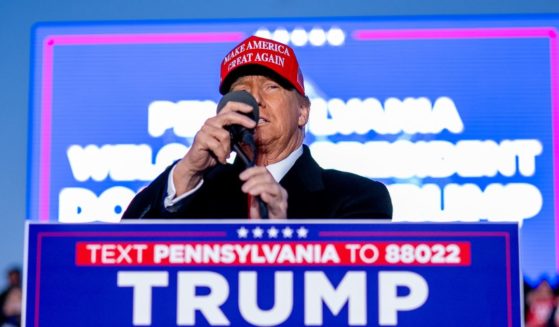Trump Must Fight Foreign Leverage in Our Tax Code
In three months and three separate foreign policy decisions designed to bolster U.S. interests, President Donald Trump has made substantial progress curbing foreign power internationally, but there is still plenty of work to be done on the home front.
The tug-of-war for international hegemony doesn’t always manifest in grandiose conflicts on the world stage. The fight is often much more insidious. To observe the subtle influence of foreign power over the United States, one need only look at our own tax code.
Oftentimes, special interest groups carve out advantages within our tax system to prop up foreign-based companies at the expense of American industry. Take, for example, a 2014 analysis by the Alliance for Competitive Taxation which found that the U.S. tax code encourages foreign takeovers of American companies. Foreign companies undoubtedly take advantage of the loopholes provided to them, as well as the obstacles erected for domestic firms. These benefits, provided courtesy of the American taxpayer, give our national adversaries increased economic leverage. By allowing foreign competitors to out-compete our own businesses, these exemptions and loopholes undermine our nation’s economic prosperity.
The Trump administration, in concert with Congress, has already rectified some of these concerns by eliminating anti-competitive provisions in the Tax Cuts and Jobs Act. One of their most important achievements in this bill was eliminating the insurance tax haven loophole, which provided a substantial competitive advantage to foreign insurers by allowing them to dodge the taxes that American companies are forced to pay. The companies abroad were incentivized to defer taxes on premiums from American customers and transfer their assets to tax havens like Bermuda and Switzerland. As such, the foreign insurance companies would essentially leech off the American taxpayer and be given a competitive advantage over U.S.-based firms, allowing foreign powers to increase their influence over America’s economic system. Republicans’ decision to remove provisions like this one boosted American competitiveness and brought American companies that had no choice but to migrate overseas back home.
While removing this provision was undoubtedly beneficial, there is a lot more achievements that can be made to further help American businesses fairly compete. For example, by taxing certain foreign profits at an even lower rate than what is charged on those in the U.S., giving tax-free treatment for what is deemed a reasonable amount of return of this foreign income, the tax code incentivizes multinational companies to add facilities in foreign countries instead of in America. To bolster American competitiveness further, Treasury Secretary Steve Mnuchin must work with Congress to remove this gross imbalance, which encourages U.S. companies to add to the $2 trillion they already have stashed overseas rather than bring it back home.
Unfortunately, however, rather than continuing to propel U.S. competitiveness by making further changes to the U.S. tax code, there is a chance that things may move in the wrong direction. Special interests itching to get their artificial competitive advantage back are now seemingly pushing the administration to resurrect several of the anti-competitive provisions killed through the Tax Cuts and Jobs Act, including the insurance tax haven loophole.
The changes that Congress and the Trump administration have made to the tax code so far have unquestionably turbocharged the U.S. economy. Because of the fairer market landscape, projections for 2018 real GDP growth increased by 50 percent. Over 500 companies have praised the changes. 5.5 million American workers received bonuses, and their wages are rising at the fastest rate in years. Given these striking numbers, why would the administration even consider going backward rather than forward?
The reinstatement of any of loopholes would be detrimental to the American business community. Given President Trump’s determination to combat foreign influence, the administration should act decisively to squash this insidious effort by foreign special interests to invade our tax system by rejecting their lobbying calls.
The Trump White House has an impressive two years of tax reform under its belt, but it still has a whole half a term to go and a whole lot more to prove. Plenty of administrations in years’ past have reversed the positive changes to tax laws they initially implemented. It will be a shame if the Trump White House become the latest example of disappointment. Over the next two years, Congress and the Department of Treasury must build on the added U.S. competitive they have resurrected by implementing more effective changes to the tax code, not reverting to the Obama status quo. I am confident that they are up for the task.
Bay Buchanan is a former Treasurer of the United States and political commentator.
The views expressed in this opinion article are those of their author and are not necessarily either shared or endorsed by the owners of this website. If you are interested in contributing an Op-Ed to The Western Journal, you can learn about our submission guidelines and process here.
Truth and Accuracy
We are committed to truth and accuracy in all of our journalism. Read our editorial standards.











